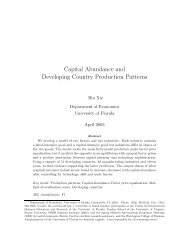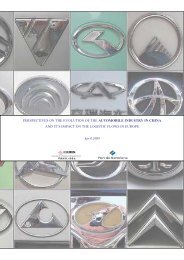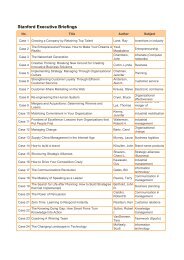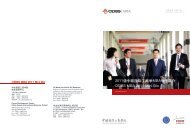游戏开始 - China Europe International Business School
游戏开始 - China Europe International Business School
游戏开始 - China Europe International Business School
You also want an ePaper? Increase the reach of your titles
YUMPU automatically turns print PDFs into web optimized ePapers that Google loves.
主要是由于它的非标准化,同一款菜,同一处就餐<br />
环境,甚至同一个就餐者,只要心境不同,就餐的<br />
感觉也就会截然不同,因此就餐指南需要更多的人<br />
文关怀。李雄窥测到餐饮信息市场的这一缺憾,为<br />
了弥补就餐指南服务的不足,便创建了“食在广州第<br />
一网”。网站上不仅增加了餐厅、菜系的分类和介绍,<br />
还配有图片,标明价格,并且在每家餐厅介绍后面<br />
附上交通路线地图以及网民点评。更具特色的是,<br />
公司还开设了订座小秘书,只要顾客记住一个订座<br />
电话就等于记住广州地区 5000 家餐厅订座电话,省<br />
去了顾客从手册里一一寻找不同餐厅订座电话的时<br />
间和精力。此外,顾客还可以直接从网上下载各个<br />
餐厅的优惠券。“食在广州第一网”的核心价值在于:<br />
第一,无论身处何地,都可以第一时间通过“食在<br />
广州第一网”了解餐厅的详细信息,提前订座;第<br />
二,享受“食在广州第一网”给客户带来的餐厅特定<br />
优惠折扣。这些增值服务让顾客既省心又省钱,得<br />
到了真正的实惠!<br />
封面关注 创业阶段2:成长 TheLINK 2007 冬季刊 TheLINK Winter 2007/8<br />
STARTUP #2: GROWTH PHASE COvEr STOry<br />
起步维艰:如何建立起关键的数据库?无论是说服餐厅老板,还是引入<br />
银行合作者,李雄的解决办法是双赢战略。<br />
“食在广州第一网”拥有一个较为完善的餐厅<br />
数据库。就餐环境、菜式介绍、平均消费等数据指<br />
标也是经过与消费者多次交流后最终确立的。创业<br />
初期,为了获得一手的餐厅数据资料,李雄亲自登<br />
门拜访餐厅经理,也曾屡次被人拒之门外,然而挫<br />
折并未消磨他的斗志,他开始反思别人为什么要拒<br />
绝自己。站在餐厅老板的位置上思考,他很快就想明<br />
白了其中道理,因为餐厅老板关心的是:我的餐厅是<br />
不是天天有人登门,我的产品是不是天天有人知晓。<br />
于是,他重新敲开餐厅老板办公室的门,从如何满<br />
足餐厅老板需求的角度,说服老板同自己合作。<br />
那么如何吸引顾客前往网上推荐的餐厅吃饭<br />
呢?有一次李雄和一位香港朋友吃饭,结账的时候,<br />
那位香港朋友从钱包里翻出一叠信用卡,问服务员<br />
哪张信用卡可以打折。正是这个举动启发了李雄。首<br />
先,他制作了一本样书,书中含有广州各大特色餐馆<br />
和菜系的介绍,并配有彩色图片和优惠券。随后,<br />
他带着样书找到某上市银行的行长,他对行长说,“如<br />
果贵行愿意在上面做广告,那我就把所有优惠权都<br />
签给贵行”。行长带着怀疑的口吻反问道:“行吗?”,<br />
RISK-TAKER: When few restaurants and fewer investors were convinced by Li’s project back in 2004, he tried the risky – and<br />
expensive – plan of developing a prototype product first, then securing investment. The scheme worked and Li attracted one of<br />
<strong>China</strong>’s Big Four banks as a partner. Here, Li inspires his management team in Guangzhou.<br />
a small fee to list with the Guide, then invites<br />
client restaurants to use his service to organize<br />
promotional events. Another revenue stream is<br />
the agreement with <strong>China</strong> Mobile in which the<br />
telecom giant shares the pay-per-message rev-<br />
enue earned by phone users of the Guide serv-<br />
ice. Last, the Guide cooperates with corporate<br />
partners to create customized products such as<br />
dining coupon books that give bank customers<br />
a discount on meals when they use the bank-<br />
issued credit cards at listed restaurants. These<br />
three channels have seen the Guide’s revenue<br />
jump from zero in 2006 to RMB1.4 in 2007.<br />
But such figures make Li’s success sound<br />
easily won. In fact, just three years ago, he faced<br />
serious difficulties in launching. First, he needed<br />
listed companies to attract viewers. Thus, before<br />
he could launch the service in January 2005,<br />
he had to compile a comprehensive database of<br />
eateries. But restaurateurs were reluctant to list<br />
on a site with no track record of user-ship. After<br />
setting face-to-face meetings with hundreds of<br />
reluctant restaurateurs, many repeatedly refused<br />
to cooperate. After several months of stalemate,<br />
Li decided to take a radical approach.<br />
juMP-sTArT<br />
Li’s strategy for jump-starting the business was<br />
to create a mock-up sample of a traditional print-<br />
ed restaurant guide, with several twists. First,<br />
he sought to attract support from one of <strong>China</strong>’s<br />
Big Four state-run banks. Customers could only<br />
use the coupons for the restaurants in the book if<br />
they paid using the bank’s credit card. When the<br />
bank president remained unconvinced, Li added<br />
a sweetener: he would defer the contract signing










